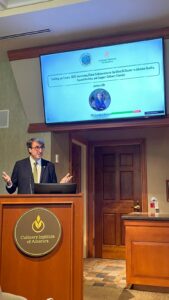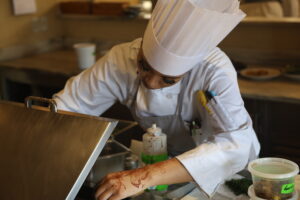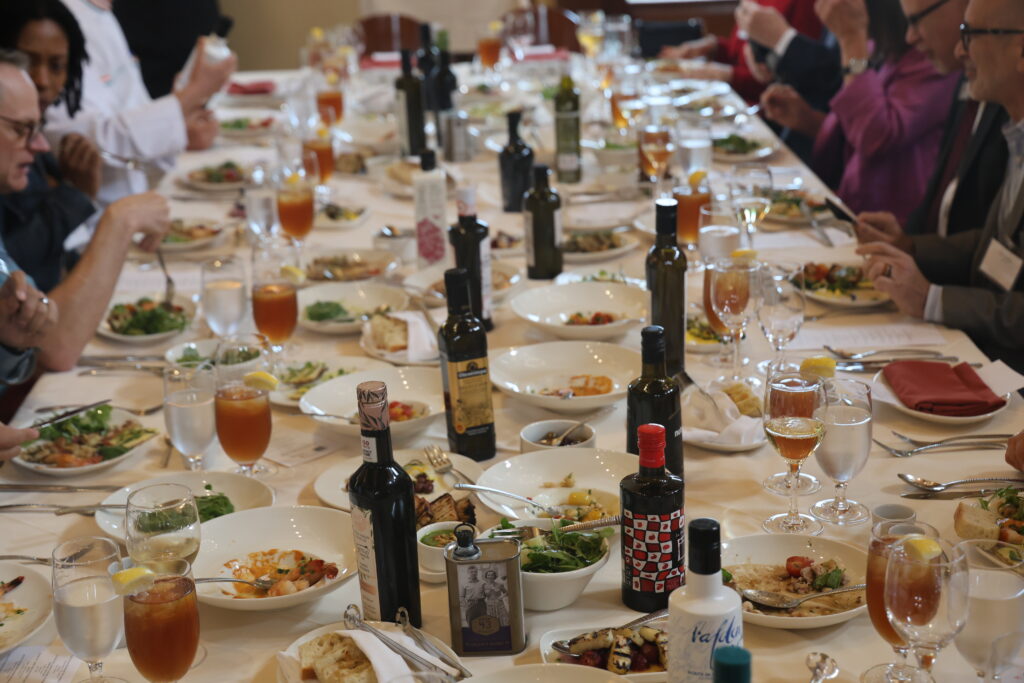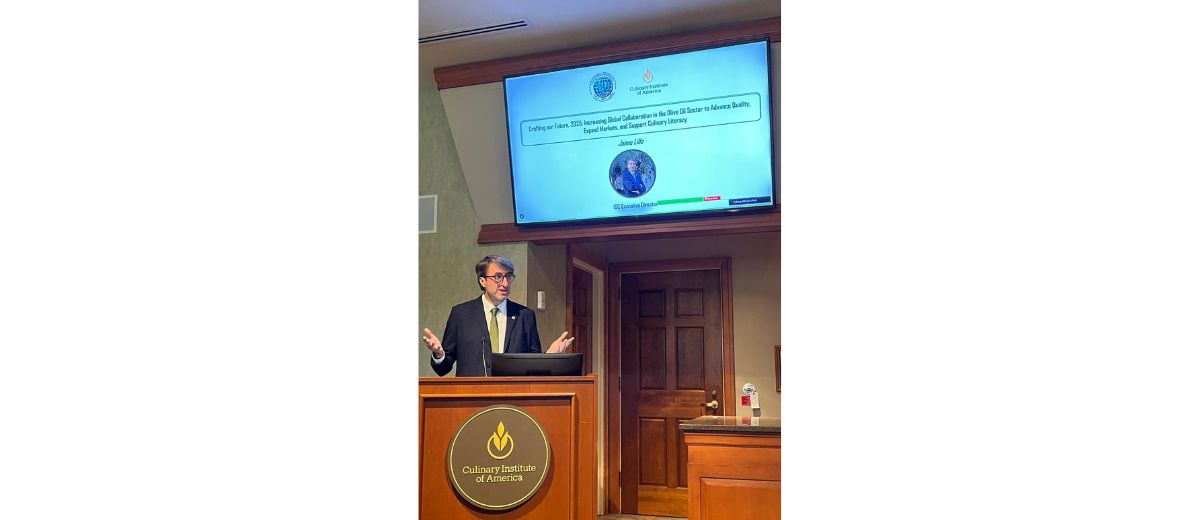The International Olive Council (IOC), in partnership with The Culinary Institute of America (CIA), held a high-level scientific and regulatory meeting today under the theme “Olive Oil and the World Table: Dialogues on the Future to Advance Quality in the Olive Oil Sector”. The event, hosted at the CIA’s Hyde Park campus in New York, brought together an outstanding group of government officials, scientists, industry leaders and technical experts in a hybrid format.
The meeting is part of ongoing preparations for the 29th session of the Codex Committee on Fats and Oils (CCFO) scheduled for February 2026 in Malaysia, where the revision of the Codex Alimentarius standard for olive oils and olive pomace oils will be on the agenda.
“The IOC once again reaffirms its role as the global reference forum for scientific debate on olive oil standardisation,” stated Jaime Lillo, Executive Director of the IOC. “It is essential that standards are developed ensuring that they are scientifically sound, objective, and based on real production data. This is crucial to facilitate fair trade, prevent fraud, and protect consumers globally.”
A Programme Focused on Science, Standards and Collaboration
 The day opened with a keynote address by Jaime Lillo, titled “Crafting Our Future, 2025,” highlighting the importance of international cooperation to advance quality standards, expand markets and foster culinary literacy.
The day opened with a keynote address by Jaime Lillo, titled “Crafting Our Future, 2025,” highlighting the importance of international cooperation to advance quality standards, expand markets and foster culinary literacy.
A significant portion of the programme was dedicated to exploring the scientific perspectives on international standards of quality in olive oil.
The technical sessions were led by a panel of globally recognised experts. Dr Mercedes Fernández Albaladejo, Head of the IOC’s Standardisation and Research Unit, guided the discussions with clarity and precision. Dr. Selina Wang from the University of California, Davis, contributed her deep expertise in oil chemistry, while Dr. Claudia Guillaume, General Manager of the Modern Olives Laboratory in Australia, provided valuable insights from her extensive experience in olive oil testing and analysis. Joining them was Dr. Anna Cane, Scientific and Public Affairs Director at Deoleo, a seasoned expert in food chemistry and international quality standards.
Further perspectives were provided by Dr. Wenceslao Moreda from the Spanish National Research Council (CSIC) and Dr. Maurizio Servili, Professor at the University of Perugia, both long-standing contributors to olive oil research and standard-setting. The roundtable also benefited from the insights of Dr. Angelo Faberi, senior official from the Italian Ministry of Agriculture and Chair of the Codex electronic Working Group (eWG), and Dr. Sarah Cahill, Secretary of the Codex Alimentarius Commission, who shared the Codex perspective on standard-setting processes.
Adding valuable voices from the industry were Kimberly Houlding, President of the American Olive Oil Producers Association (AOOPA); Leandro Ravetti, CEO of Cobram Estate Olives Limited; Joseph Profaci, Executive Director of the North American Olive Oil Association (NAOOA); and Thierry Moyroud, Chief North America & LATAM Officer at Deoleo, who each brought crucial reflections from their respective sectors.
A Growing Market with Expanding Opportunities
With consumption reaching 398,000 tonnes in the 2023/24 crop year — a 22% increase compared to a decade ago — the United States has become the world’s second-largest importer of olive oil. Domestic production is estimated at only 10,000 tonnes, meaning that 96% of U.S. consumption depends on imports. This underscores the country’s crucial role in international olive oil trade.
In response to this growing consumer interest, the forum also examined the opportunities presented by the rising popularity of the Mediterranean diet and plant-forward cuisine. A highlight of the day was the presentation of a new olive oil educational initiative that the CIA will soon launch. Aimed at chefs, foodservice professionals, and retailers, the programme will focus on topics such as sensory evaluation, quality standards, product excellence and strategies to engage and educate consumers about olive oil.
Beyond Standards: A Vision for the Future
 In the afternoon, the focus shifted to a broader view of the olive oil sector’s future. The session “Sustaining Our Future” examined the intersection of global nutrition, sustainability, and health imperatives — with particular attention to the forthcoming EAT-Lancet 2.0 report — and how these factors shape the evolving role of olive oil in sustainable food systems.
In the afternoon, the focus shifted to a broader view of the olive oil sector’s future. The session “Sustaining Our Future” examined the intersection of global nutrition, sustainability, and health imperatives — with particular attention to the forthcoming EAT-Lancet 2.0 report — and how these factors shape the evolving role of olive oil in sustainable food systems.
This discussion was enriched by contributions from Greg Drescher, Senior Advisor at the CIA, renowned for his leadership in sustainable food initiatives; Alexandra Devarenne, CEO of the Extra Virgin Alliance and a respected educator in olive oil quality and marketing; and Jason Potanovich, Associate Dean at the CIA, who is instrumental in advancing culinary education around olive oil.
Participants also enjoyed an “Olive Oil Discovery and Tasting Lunch”, featuring the award-winning oils from the IOC’s 2025 Mario Solinas Quality Awards alongside premium oils from California and other regions, offering a sensory exploration of excellence in extra virgin olive oil.
A Platform for Scientific Consensus and Fair Trade
This landmark meeting reaffirmed the IOC’s role as the global scientific and regulatory authority for the olive oil sector. Through engagement with member states and observer countries — including the United States — the IOC continues to ensure that international standards are founded on rigorous science, global consensus, and a shared commitment to equitable trade and consumer protection.
The programme and speaker bios are available here.










